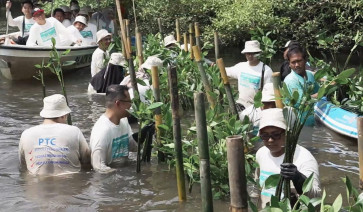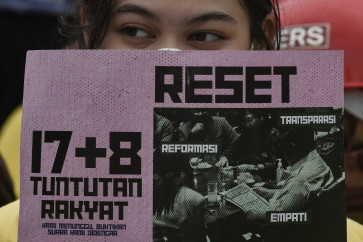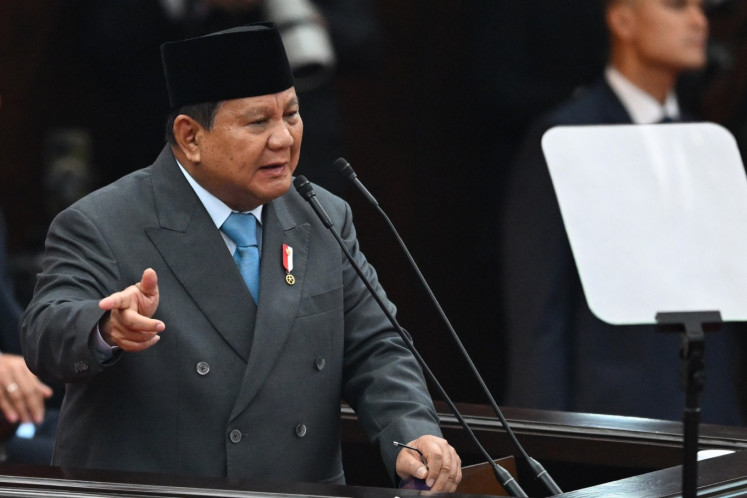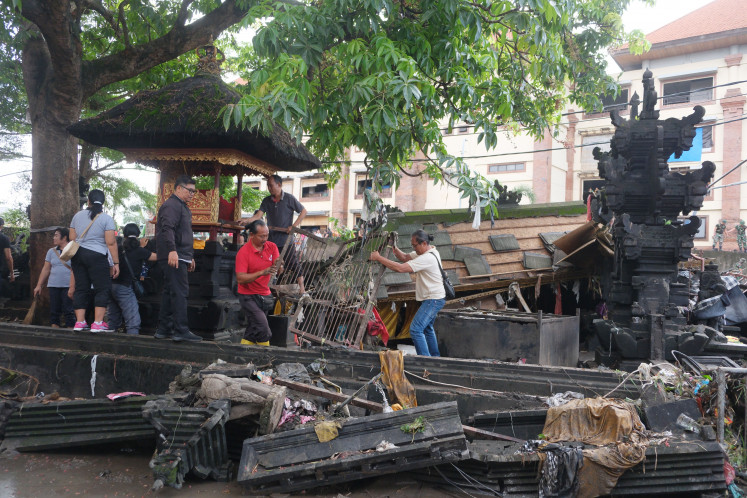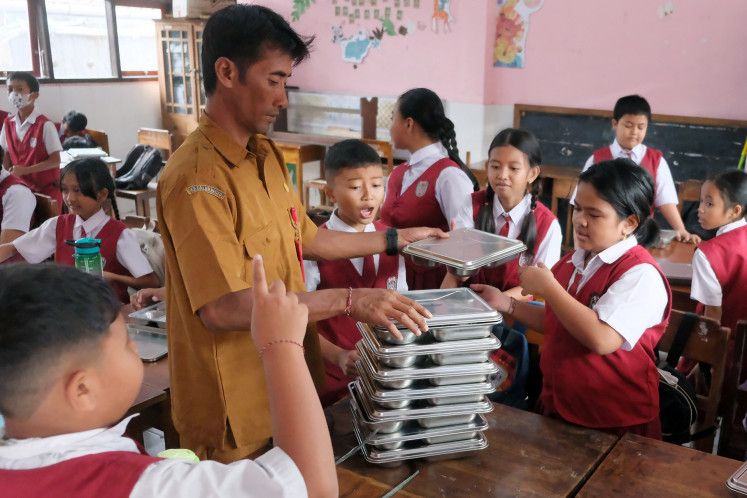Popular Reads
Top Results
Can't find what you're looking for?
View all search resultsPopular Reads
Top Results
Can't find what you're looking for?
View all search resultsPKI legacy still a contest of perceptions
Contested memories: The statues of the officers killed at the climax of a power struggle on Sept
Change text size
Gift Premium Articles
to Anyone
C
span class="caption">Contested memories: The statues of the officers killed at the climax of a power struggle on Sept. 30 – Oct. 1, 1965, stand over a relief depicting the events. The monument at Lubang Buaya, South Jakarta is positioned where the victims’ bodies were found. The events and the ensuing bloodshed, which targeted suspected communists, remain the subject of debate; representatives of thousands of former political prisoners and their families, along with the families of those killed, say they have yet to gain justice. (JP/P. J. Leo)
Indonesians have inherited the legacy of 1965, a power struggle that climaxed with the murder of military leaders and included the targeting and killing of suspected communists. Eighteen years after the State Secretariat released the 1994 White Paper on the “Sept. 30 Movement” the National Commission on Human Rights reported its investigations, detailing “gross human rights violations”, recommending further investigations, prosecution and reconciliation.
Ahead of the 47h commemoration of the alleged aborted coup, and the “Pancasila Sanctity Day” of Oct. 1, The Jakarta Post’s team wrote the following reports.
Among the commemorations of the “G30S/PKI” this year is a discussion held by the Indonesian Ulema Council (MUI). It refers to the events of Sept. 30 – Oct. 1, 1965, widely believed to be a coup attempt by the banned Indonesian Communist Party (PKI). The public may now have access to various explanations, but this, coupled with the justification of the ensuing bloodshed, which targeted suspected PKI members and supporters, still remains the dominant version.
The keynote speaker at the MUI talk on Monday is the Indonesian Army chief of staff Gen. Pramono Edhie Wibowo. He is the younger brother of First Lady Ani Yudhoyono and a son of the late Lt. Gen. Sarwo Edhie Wibowo, the commander of the Army’s Special Forces, RPKAD, now known as Kopassus. Leaders of the Democratic Party, founded by President Susilo Bambang Yudhoyono, have backed proposals to name Sarwo Edhie a national hero for leading a military operation against the PKI, mainly in Central Java, in the mid-1960s.
The MUI organizers say the talks will shed light on “who are the real heroes, losers, victims, rebels and human rights violators”.
One man’s hero is another man’s villain — and until today the debates about “1965” continue along the themes of the MUI talks.
Those who brand themselves victims or human rights activists are exasperated at the lack of progress in their attempts to achieve justice and reparation for the thousands who were detained for decades without trial, as well as the offspring of these families who became scattered or stigmatized, along with descendents of the minimum estimate of 500,000 killed people.
The National Commission on Human Rights’ (Komnas HAM) July report seemed like a breakthrough; it confirmed gross human rights violations and recommended further investigations, prosecution of those accountable (though most are now deceased) and reconciliation.
But such advocates were “too eager”, said one participant of the talks involving presidential advisor Albert Hasibuan. Albert, a former commissioner, added that the President would issue a state apology — which had been an unclear plan until today.
The response from those who felt victimized by the PKI raised the expected outcry on hearing plans of a state apology. “Many NU members were killed, many of the PKI were killed, and do we really want to dig that all up again? Do we need another war?” said Nusron Wahid, the current head of the Ansor Youth organization of Nahdlatul Ulama (NU), the nation’s largest Islamic organization, claiming some 40 million members.
A former NU chairman, Abdurrahman Wahid, when serving as the fourth president, had apologized for the involvement of Anshor in the 1960s witch-hunt. But he failed in his attempts to revoke a ban on the spreading of Marxist-Leninist teachings.
“Kill, or be killed” — this was the mantra spreading across the country like wild fire in the aftermath of the alleged 1965 coup attempt on Sept. 30, 1965. Anyone suspected of being a supporter of the PKI was a target. The general perception, drummed up with the help of the media in the wake of the alleged aborted coup, was that without a massive conscious effort to eliminate them, communists would take over the nation.
It is this view that is repeatedly raised when revisiting the history books or attempting reconciliation and debates, which aim to realize justice for the political prisoners who spent much of their lives in jail and their families and the offspring of those who were killed in the witch-hunt.
Many forget that “kill or be killed” also meant one could be killed by other civilians or soldiers if they refused to kill suspected communists, or risk being accused themselves of being allies.
The version of the New Order blaming the PKI still prevails. In addition, senior writers and scholars are among the few who can still testify to vicious harassment by PKI supporters, such as those in its cultural wing, Lekra, among others led by the internationally acclaimed late author, Pramoedya Ananta Toer.
Soeharto and foreign intervention, mainly the United States, was worried about the communism “domino effect” in Southeast Asia, during the peak of the Cold War.
Historians however, have voiced doubts on the culpability and the capability of the PKI and questioned who was ultimately responsible for the coup and the bloodshed that followed.
Sukarno’s statement in December 1965, which said autopsies did not reveal generals had been castrated or their eyes gouged out (as widely reported by the media), was not published.
Such beliefs, coupled with the stigmatization of all suspected supporters and families of PKI members, lasted for over three decades, and was part of the propaganda that followed the evacuation of the officers’ bodies from a well in Lubang Buaya, South Jakarta, on the morning of Oct. 1.
The PKI contributed much resentment, to what became an ugly divide, and added to intense political frictions. According to former chairman Sulastomo, the PKI tried to have the Association of Islamic Students (HMI) banned.
Chairman DN Aidit’s “offensive revolutionary” rhetoric, the PKI’s intimidation of adversaries and its approach to cabinet members and military personnel, added to fears of a “communist takeover”, particularly as first president Sukarno tried to use all political forces to his advantage including the PKI, refusing to dissolve them despite protests.
The PKI played up class divisions, for instance against land owners, money lenders and the “bureaucrat capitalists” of towns and villages. Yet the researcher Hermawan Sulistyo says the East Java countryside, where he studied the bloodshed that occurred in its sugarcane plantation areas, lacked these class divisions. Historians say this was one crucial oversight among the PKI elite.
Hermawan is among those who share the view that although the PKI had built up massive support, even after it was crushed following the insurgency in Madiun in 1948; it was largely caught by surprise in the aftermath of the kidnapping and murder of the officers. “It was caught unarmed, unorganized and helpless,” writes Hermawan.
In Jombang and Kediri in East Java, Hermawan wrote, old grudges against the PKI gained the blessing of the army, and for various reasons civilians joined the witch-hunt.
One reason for the backlash was the PKI’s fierce campaigns against landlords (one of the seven “village satans”) and direct assaults on the local revered kyai, who held automatic authority over land (tanah wakaf). Hermawan concluded that without the army’s tactical support, the bloodshed might not have happened in these areas.
The government’s White Paper also details the PKI’s infamous “unilateral actions” that saw organized farmers taking over land in various places through the use of violence, including vandalism against the office of the East Java governor, who was also a military officer.
Whether the witch-hunt and bloodshed were “spontaneous” or not, in the words of the “1994 White Paper”, the national rights body states that the events of 1965-66 “were a result of a state policy to crush members and followers of the PKI who were considered to engage in dissenting actions against the state”.
Real ideological ties did not really matter; survivors of those turbulent times say that they joined organizations established later, which became the embryo of the ruling Golkar party, just to escape being labeled a communist, or to avoid harassment by PKI activists.
To the layperson, the precise affiliation of people to the PKI did not matter either. Members and supporters of the Indonesian Peasant Front (BTI), often claimed ignorance of the PKI, saying they joined BTI because it was the only organization representing farmers’ interests in their areas.
But what did matter was the public perception that such groups were certainly under the influence of the PKI, and were therefore valid targets to be “crushed”.
Many “heroes” and “victims”, and their direct descendents, are still alive and the “heroes” are still in power.
Harry Tjan Silalahi, who chaired the Indonesian Catholic Students Association (PMKRI), just one of many organizations daily harassed by the PKI, says there is no way a settlement can come around soon. “It takes a brave president,” he said, “and the passing of the current generation”.
Indonesia cannot be compared to South Africa’s reconciliation, he said, where the victims won and their leader Nelson Mandela forgiving the villains.
Unclassified documents in the United States pointed to the involvement of the US and the CIA in releasing a list of targets to be killed, in anticipation of Indonesia following the steps of Vietnam and growing closer to communist China. However, foreign meddling does not explain the fervor of the witch-hunt, which testimonies of survivors, proud hunters and killers of “commies” reveal either.
Thus past traumas on either side of the political divide, which pitted neighbors and even relatives against each other, are still a constraint to a crystal clear glimpse of history, let alone the mere mention of reconciliation.
— Ati Nurbaiti


